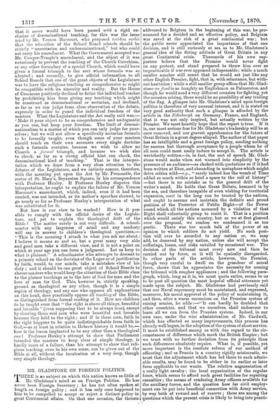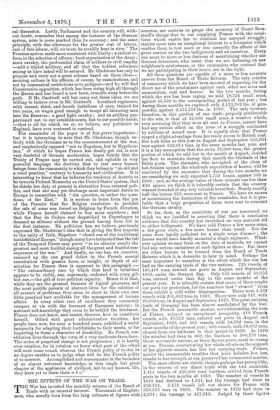MR. GLADSTONE ON FOREIGN POLITICS.
THERE is so subject on which this nation knows so little of Mr. Gladstone's mind as on Foreign Politics. He has never been Foreign Secretary ; he has not often spoken at length on foreign policy ; and it has only once happened to him to be compelled to accept or reject a distinct policy in great Continental affairs. On that one occasion, the threats , addressed to Belgium in the beginning of this war, he pro- nounced for a decided and an effective policy, and Belgium was saved at the risk of a great continental war ; but the public never appreciated the importance of that one decision, and is still curiously at sea as to Mr. Gladstone's general idea of the fitting attitude of Great Britain in any great Continental crisis. Thousands of his own sup- porters believe that the Premier would never fight on any pretext, and stand prepared to throw him over as impracticable if war ever appeared indispensable; while a much smaller number still assert that he would act just like any other English Premier, fight, that is, with reluctance, but with- out hesitation ; while a still smaller group affirm that Mr. Glad- stone au fond is as haughty an Englishman as Palmerston, and though he would need a very different occasion for fighting, yet the occasion arising, there would be no possibility of any trailing of the flag. A glimpse into Mr. Gladstone's mind upon foreign politics is therefore of very unusual interest, and it is stated on very good authority that such a glimpse is afforded by the article in the Edinburgh on Germany, France, and England, that it was not only inspired, but actually written by the Premier. We most heartily hope that the report is true. If it is, our most serious fear for Mr. Gladstone's leadership will be at once removed, and our gravest apprehension for the future of Great Britain in a great degree allayed. The author of that paper has an intelligible and a great foreign policy, needing nothing for success but thorough acceptance by a people whom he of all men could most easily induce to accept it. The article is wretchedly written—is, in fact, the sort of speech Mr. Glad- stone would make when not warmed into simplicity by the presence of an audience—as choked with quotations as if it had been written at Eton, and abounding in metaphors which might drive critics wild—e.g., "rarely indeed has the womb of Time added so much within so brief a space to the roll of history" —but there is no mistake as to the general drift of the writer's mind. He holds that Great Britain, hemmed in by the sea, and therefore incapable of even wishing for territorial expansion, must in the long run be trusted by the nations, and ought to assume and maintain the definite and proud position of the Protector of Public Right—of the Power round which all the nations menaced by a violation of that Right shall voluntarily group to resist it. That is a position which would satisfy this country, but as we at first glanced over the proposal, we confess we condemned it as too poetic. There was too much talk of the power of an opinion to which soldiers do not yield. No such posi- tion will ever be accorded to any nation or, we may add, be deserved by any nation, unless she will accept the sufferings, losses, and risks entailed by occasional war. The decision of the tribunal must every now and then be carried out by force, or it will be cynically disregarded. In other parts of the article, however, the Premier, though very careful to dwell on the grandeur of mbral force, shows that he appreciates the necessity for arming the tribunal with rougher appliances ; and the following para- graph, which, long as it is, we must quote entire, seems to us to be past all question the most hopeful official utterance yet made upon the subject. Mr. Gladstone had previously said that our Naval supremacy must be maintained, and expressed, moreover, his moral approval of the policy of maintaining it, and then, after a warm encomium on the Prussian system of raising armies, he adds :—" It can hardly be doubted that other countries, and that we ourselves, shall endeavour to learn all we can from the Prussian system. Indeed, in our own case, under the wise administration of Mr. Cardwell, which has effected so many improvements, this process has already well begun, in the adoption of the system of short service. It must be established among us with due regard to the cir- cumstances of difference which mark the British Empire ; but we trust with no further deviation from its principle than such differences absolutely require. What is, if possible, yet more important is the resolute reform of our method of officering ; and as Prussia is a country rigidly aristocratic, we trust that the adjustment which has led there to such admir- able results, may be found to be either in its earlier or later form applicable to our wants. The relative augmentation of a really light cavalry ; the looal organization of the regular force, which seems to afford such great facilities for repairing casualties ; the means of rendering Army officers available for the auxiliary forces, and the question how far civil employ- ment can be put into beneficial connection with Army service, by way both of reward and of reserve ; these are among the questions which the present crisis is likely to bring into practi-
cal discussion. Lastly, Parliament and the country will, with- out doubt, remember that among the features of the German system, none is more marked than its economy ; and the same principle, with due allowance for the greater cost of labour, and of free labour, will, we trust, be steadily kept in view." The Prussian system made more consistent with liberty; a radical re- form in the selection of officers ; local organization of the Army ; more cavalry, the preferential claim of soldiers to civil employ —add a tripled artillery, and all that the boldest reformers among us have asked will be secured. Mr. Gladstone has only to propose and carry out a great scheme based on those ideas—. securing culture in his officers, of course, by examinations, and not by nonsensical restrictions as to pedigree—and he will find Conservative opposition, which has been rising high all through the Ii.ecess and has found a new lever, crumble away before his path. If Mr. Cardwell will but carry out those ideas, we are willing to believe even in Mr. Cardwell. Localized regiments, with second, third, and fourth battalions of men, trained for two years, on wages good enough to tempt all labouring men into the Reserves ; a good light cavalry ; and an artillery pro- portioned not to our establishments, but to our possible needs, —that is all for which we or, we believe, any publicists in England, have ever ventured to contend.
The remainder of the paper is of less grave importance ; but it is interesting to note that Mr. Gladstone, though en- tirely with the Germans as to the commencement of the war, and emphatically opposed "not to Napoleon, but to Napoleon- ism," of which he hopes France has finally got rid, is now very doubtful of German moderation, hopes faintly that the Treaty of Prague may be carried out, and upholds in very powerful language the doctrine that to tear away human beings from the community to which they belong is "an old and a cruel practice," contrary to humanity and civilization. It is interesting to know that he believes the tendency of Austria to be towards Federal Monarchy on the United States' system, that he thinks her duty at present is abstention from external poli- tics, and that she may yet discharge most important duties to Europe in connection with "the question, or rather the ques- tions, of the East." It is curious to learn from the pen of the Premier that the Belgian resolution to prohibit the sale of arms was forced on Belgium by French dictation, while France herself claimed to buy arms anywhere ; and that the Due de Cadore was despatched to Copenhagen to demand an affiance without the ground having been felt in the first instance. No politician has, we believe, previously expressed Mr. Gladstone's idea that in giving the first impulse to the unity of Italy, Napoleon 'closed one of the traditional battlefields of Europe," though many have intimated that the fall of the Temporal Power may prove "in its ulterior results the greatest and most fruitful among all the great and fruitful con- sequences of the war." And finally, no one has, we conceive, summed up the one grand defect in the French mental constitution with greater force, or insight, or depth of ad- miration for France than is apparent in this paragraph :— " The extraordinary race by which that land is inhabited appears to be richly, nay, supremely, endowed with every gift but one,—the gift of true political sagacity. Hence it is that, while they are the greatest framers of logical processes, and the most prolific parents of abstract ideas for the solution of all manner of problems, they seem to show in their own case little practical tact available for the management of human affairs. In every other race of excellence they commonly conquer or vie with the foremost of European nations ; in national self-knowledge they seem to be behind the hindmost.
France does not know, and cannot discover, how to constitute herself. Gifted with great administrative faculties, her people have now, for near a hundred years, exhibited a woful incapacity for adapting their institutions to their wants, or for imparting to them a character of durability. No French con- stitution lives through the term of a very moderate farm-lease.
The series of perpetual change is not progression ; it is hardly even rotation, for in rotation we know what part of the wheel will next come round, whereas the French polity of to-day in no degree enables us to judge what will be the French polity of to-morrow. Accomplished and consummate in the branches of an almost universal knowledge, in this single but great chapter of the appliances of civilized, not to say human, life, they have yet to learn their a b c."



































 Previous page
Previous page